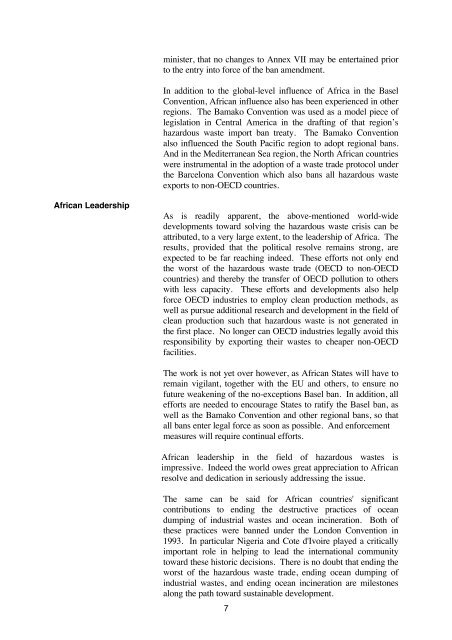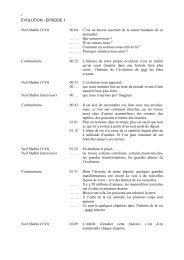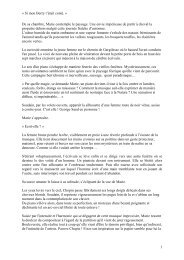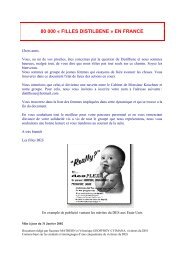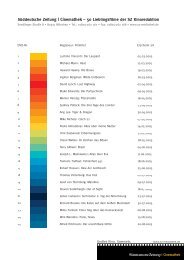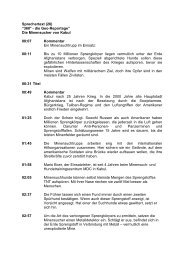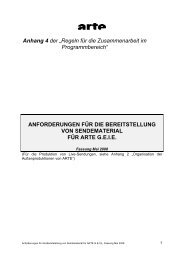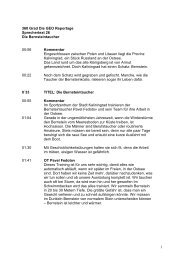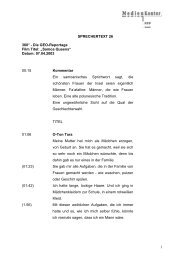POPs IN AFRICA HAZARDOUS WASTE TRADE 1980 - 2000 ... - Arte
POPs IN AFRICA HAZARDOUS WASTE TRADE 1980 - 2000 ... - Arte
POPs IN AFRICA HAZARDOUS WASTE TRADE 1980 - 2000 ... - Arte
You also want an ePaper? Increase the reach of your titles
YUMPU automatically turns print PDFs into web optimized ePapers that Google loves.
African Leadership<br />
minister, that no changes to Annex VII may be entertained prior<br />
to the entry into force of the ban amendment.<br />
In addition to the global-level influence of Africa in the Basel<br />
Convention, African influence also has been experienced in other<br />
regions. The Bamako Convention was used as a model piece of<br />
legislation in Central America in the drafting of that region’s<br />
hazardous waste import ban treaty. The Bamako Convention<br />
also influenced the South Pacific region to adopt regional bans.<br />
And in the Mediterranean Sea region, the North African countries<br />
were instrumental in the adoption of a waste trade protocol under<br />
the Barcelona Convention which also bans all hazardous waste<br />
exports to non-OECD countries.<br />
As is readily apparent, the above-mentioned world-wide<br />
developments toward solving the hazardous waste crisis can be<br />
attributed, to a very large extent, to the leadership of Africa. The<br />
results, provided that the political resolve remains strong, are<br />
expected to be far reaching indeed. These efforts not only end<br />
the worst of the hazardous waste trade (OECD to non-OECD<br />
countries) and thereby the transfer of OECD pollution to others<br />
with less capacity. These efforts and developments also help<br />
force OECD industries to employ clean production methods, as<br />
well as pursue additional research and development in the field of<br />
clean production such that hazardous waste is not generated in<br />
the first place. No longer can OECD industries legally avoid this<br />
responsibility by exporting their wastes to cheaper non-OECD<br />
facilities.<br />
The work is not yet over however, as African States will have to<br />
remain vigilant, together with the EU and others, to ensure no<br />
future weakening of the no-exceptions Basel ban. In addition, all<br />
efforts are needed to encourage States to ratify the Basel ban, as<br />
well as the Bamako Convention and other regional bans, so that<br />
all bans enter legal force as soon as possible. And enforcement<br />
measures will require continual efforts.<br />
African leadership in the field of hazardous wastes is<br />
impressive. Indeed the world owes great appreciation to African<br />
resolve and dedication in seriously addressing the issue.<br />
The same can be said for African countries' significant<br />
contributions to ending the destructive practices of ocean<br />
dumping of industrial wastes and ocean incineration. Both of<br />
these practices were banned under the London Convention in<br />
1993. In particular Nigeria and Cote d'Ivoire played a critically<br />
important role in helping to lead the international community<br />
toward these historic decisions. There is no doubt that ending the<br />
worst of the hazardous waste trade, ending ocean dumping of<br />
industrial wastes, and ending ocean incineration are milestones<br />
along the path toward sustainable development.<br />
7


